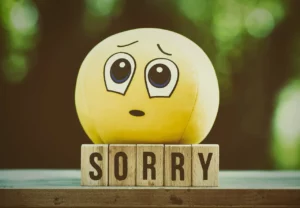What Children Understand

A child who has never been apologized to won’t understand the apology process, and more than likely he or she will refuse to apologize, turning a potentially beneficial moment into a standoff with hurt feelings.
Children are born with the capacity for love empathy and understanding. According to Craig Smith, “Children as young as four can grasp the emotional implications of apologies.”1
Parents/caregivers often expect children to make apologies immediately after offending someone. But children (and adults) often need time to process their mistake before they feel genuinely remorseful and ready to make an apology.
Children’s Understanding of Apologies
Here’s a link to a three-minute video you may enjoy. Children’s Understanding of Apologies.
What Teens Understand
Teens can learn and understand healthy behaviors and values without adults present because they are learning to function more independently.
While teens learn by making plenty of mistakes, they still need parents/caregivers to help them provide structure for that learning.
Teens are dealing with emotions that make them believe that anyone who is not their age does not understand what they are going through.
Teens are likely to feel remorseful, guilty, or uneasy when they make a mistake or cause hurt. Deep down they know they should apologize, but they may hesitate, afraid of appearing weak or admitting fault. Teens are more willing to apologize in the future with other healthy relationships when they see their parents/caregivers willing to apologize to mend relationships.
What do you think your children and teens understand about apologies?
Sources:
- Smith, Craig. When should you make your kids apologize? The Conversation, November 1, 2017. https://www.cnn.com/2017/11/01/health/parents-ask-kids-apologize/index.html
- Brill, Ariadne. Children Are Wired for Empathy and Insisting On Apologies Is Not Necessary. August 6, 2017. https://www.positiveparentingconnection.net/teach-child-say-sorry/
- Craig Smith. August 27, 2008. youtube.com/watch?v=tb8vM4mDdDk
- Brown, Neil. How To Make Your Teen Apologize. July 13, 2019. https://neildbrown.com/17-blog/parenting/how-to-make-your-teen-apologize/
- Tucker, Jessica. Apologize To Your Teen (Yep, You Should). January 31, 2022. https://www.moms.com/why-parents-should-apologize-to-teens/
- Moriarty, Donna. The Importance of Saying Sorry for Teens (and Parents). No date. https://yourteenmag.com/family-life/communication/importance-saying-sorry
- Image: excuse-me-5079442_1280 [Pixabay.com]

